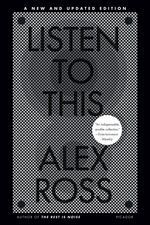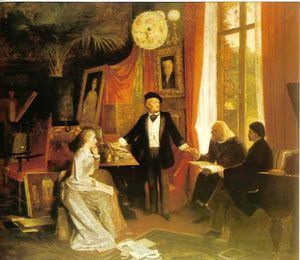Alex Ross's Blog, page 214
October 24, 2011
Don't listen to that
 The American paperback of my book Listen to This arrives in stores this week. We've added my recent essay about John Cage; my audio guide has been updated accordingly. Here again is the video we made for the initial release for the book last year, featuring Ethan Iverson, Tyondai Braxton, and Rebecca Ringle. The UK paperback is already out. On Thursday of this week, I will give a lunchtime talk at the 92nd Street Y Tribeca — a visually enhanced version of my "Chacona" lecture. On Nov. 3, I'll speak at Lawrence University in Appleton, Wisconsin; on Nov. 8 I'll read at Powerhouse in Brooklyn; and on Nov. 16 I'll appear at Boston College. A little later in the fall, I may bother you with news about a couple of events dramatizing the release of Best Music Writing 2011, which I co-edited with Daphne Carr. There may be Denk.
The American paperback of my book Listen to This arrives in stores this week. We've added my recent essay about John Cage; my audio guide has been updated accordingly. Here again is the video we made for the initial release for the book last year, featuring Ethan Iverson, Tyondai Braxton, and Rebecca Ringle. The UK paperback is already out. On Thursday of this week, I will give a lunchtime talk at the 92nd Street Y Tribeca — a visually enhanced version of my "Chacona" lecture. On Nov. 3, I'll speak at Lawrence University in Appleton, Wisconsin; on Nov. 8 I'll read at Powerhouse in Brooklyn; and on Nov. 16 I'll appear at Boston College. A little later in the fall, I may bother you with news about a couple of events dramatizing the release of Best Music Writing 2011, which I co-edited with Daphne Carr. There may be Denk.
October 23, 2011
Operatic road trip
Opera on the Plains. The New Yorker, Oct. 24, 2011 (subscribers only).
Christus, Parsifal

Listening live to Christus on Liszt's birthday yesterday, I was struck again by the complexity of the Liszt-Wagner relationship. There are numerous echoes of Liszt in Wagner, of course, but the resonances are probably most acute in Parsifal, which draws on various religious works of Liszt, Christus included. Here is the opening of "Tristis est anima mea," the Mount of Olives scene (from the Helmuth Rilling recording):
And here is the passage in Parsifal which tells of how Titurel found Kundry asleep in the place where he was building Montsalvat (from the Thielemann recording, with Franz-Josef Selig as Gurnemanz):
The passages are scored in a similar way, with muted violins against clarinets, bassoons, horn, and lower strings in Liszt and muted violas against clarinets, bassoons, and tremolo cellos in Wagner. As so often with Wagner, the gesture is at once a theft and an homage, perhaps also a clue. After all, the "Tristis" text contains the line "Pater, si possibile est, transeat a me calix iste" ("O my Father, if it be possible, let this cup pass from me").
October 22, 2011
Liszt 200
A very happy birthday to Liszt Ferenc, who was born two hundred years ago today. Above is Claudio Arrau playing Les Jeux d'eaux à la Villa d'Este; Jessica Duchen gathers more celebratory videos on her blog. Kenneth Hamilton has a fine, unsentimental appreciation in the New York Times; I wrote about Liszt back in 2003. There will be no fewer than than eleven performances of Liszt's oratorio Christus today, with the Paris version going out over France Musique at 7PM CEST. Although the extant discography is staggering — Leslie Howard's ninety-nine-CD survey on Hyperion gives you every note the man wrote for piano — there's been no lack of notable Liszt recordings in the anniversary year: the Nelson Freire collection Harmonies du soir, Louis Lortie's survey of the complete Années du pèlerinage, Marc-André Hamelin's account of the Sonata in B Minor, Pierre-Laurent Aimard's Liszt Project. As for My Piano Hero, well, the cover remains arresting.
October 21, 2011
Early Sellars
Sellars in Bolinas, California, 2007.
Robert Kiely, the longtime master of Adams House, a complex of undergraduate dorms at Harvard College, recalls how he gave a helping hand to a future genius of opera production:
A jolly personage came smiling up to me, shook my hand vigorously, introduced himself as Peter Sellars '80, and asked for twenty-five dollars from the Master's Fund to clean up and paint an old basement storage room so that it could be used as a theater. At first I thought he was kidding, but it quickly became clear to me that despite deferential giggles and guffaws he was in earnest. So I figured, twenty-five bucks, what can I lose? But little did I imagine what Adams House and the college were about to gain! Within days, the dungeon-like space was cleaned, painted, and lighted. Not very well lighted, but there were a light bulb and two small dirty windows looking out at people's feet passing up and down Plympton Street. Soon those feet were headed to Explosives B, the new Adams House theater, seating capacity a comfortable twenty or an uncomfortable forty sitting on mattresses left over from storage. The first production, if I remember correctly, was a Polish satire that involved an enormous hand made of plywood that kept entering menacingly from the only door. The performances, the concept (short plays, no admission charge, limited space, late starting times), and the unbounded creativity and imagination of the director and actors made the place a sensation. Everyone wanted to come! People lined up in Randolph Court hoping to squeeze in.
Theatrical talent and ideas rained down on Adams House. A new play seemed to appear every few weeks. Some were new and experimental, others old favorites. Nothing seemed too ambitious. I went to them all, but some still seem to have been impossibly terrific. Peter decided to do something Russian. Was it Boris Godunov? Anyway, it was a mammoth Russian opera cut down to forty minutes. Peter liked moving his audiences around, so it began in Explosives B, then, with the director leading us on like Puck, we moved to the billiard room where Boris or someone died on the green felt table, and then we all were taken (in a lightly falling snow) to the Lowell House courtyard where I swear he had arranged to have the Russian bells ring. Am I dreaming this? Some of the details may be wrong, but the picture is right. Other classics followed in various unlikely places: a thirty-five-minute Macbeth with three actors in the tunnels; Genet's The Balcony utilizing the staircase of the Gold Room; and, most memorable of all, Antony and Cleopatra in the Adams House pool (audience sitting around the sides, Cleopatra enthroned on a raft in the middle of the water). They were some of the very best, most original theater I have ever seen at Harvard. Peter would sit in the dining hall, eyeing the crowd and then walk up to someone who had never been on stage, saying, "You would be a terrific Lady Macbeth."
This is from an Adams House alumni newsletter called Gold Coaster. I should disclose that Kiely was my thesis adviser, and a extraordinarily generous counselor. He has a new book entitled Blessed and Beautiful: Picturing the Saints.
October 20, 2011
Thought of the day
Earlier this month I saw Laurie Anderson perform in Kansas City. Her show made a deep impression on me, and something that rang in my head with particular force was her quotation from an old movie: "There's trouble out at the mine! There's trouble out at the mine!" She ran her voice through her "voice of authority" Vocoder, so that it took on chilling weight: "Patriots! Citizens! There's trouble out at the mine!" I haven't been able to shake it, for perhaps obvious reasons.
October 19, 2011
Miscellany: Ives vs. McCartney, etc.
The SONiC Festival ends on Saturday night with a free concert by the American Composers Orchestra at the World Financial Center. Yes, a guy from a famous rock band is involved, but there are other reasons to go — Andrew Norman's brilliant piece Unstuck, for example. You can listen to music from the opening-night program at Performance Today; Alex Temple's Liebeslied, with delirious vocals by Mellissa Hughes, is something quite amazing.... The Great Flood, a new collaboration between guitarist/composer Bill Frisell and the filmmaker Bill Morrison (he of Decasia and The Miners' Hymns), memorializes the 1927 Mississippi River flood. The premiere is at Zankel Hall on Nov. 4.... Jeremy Schlosberg muses on the need for good music curators.... The hits keep coming at Medici TV: up now is a gorgeous performance of Cavalli's Didone, with William Christie conducting Les Arts Florissants at the Théâtre de Caen. At least the first half is gorgeous; I can't get Part 2 to work.... Opera Vista, in Houston, is presenting Thomas Adès's pitch-black operatic comedy Powder Her Face on Nov. 10 and 11.... New World Records has digitized the entire old CRI LP catalogue. Dog of Stravinsky!.... Congratulations to the culture-criticism site ArtsATL for receiving a $20,000 challenge grant from the Possible Futures foundation.... Sources close to the Internet are telling me that the new Ives CD by violinist and video ironist Hilary Hahn came within a hundred copies of unseating Paul McCartney from his ill-earned position on top of the Billboard classical chart. Can crusty old Ives defeat winner-takes-all celebrity culture? Next week will tell.
Too cool for school
I'm not going to review the Met's new production of Don Giovanni — my column next week will be focused on performances elsewhere in the country. In any case, I wouldn't have much to add to scathing reports by Likely Impossibilities, James Jorden, and Zachary Woolfe. Michael Grandage's staging is, as Zack says, a "nonevent." He gets to the heart of the problem when he quotes a recent Peter Gelb interview to the effect that Grandage deserves praise for his "cool and elegant aplomb." Opera is not a cool and elegant art form. Don Giovanni is not a cool and elegant opera. And, even if it were, to call this production cool and elegant would be to overpraise it greatly. It is just unpardonably dull. Peter Mattei sang beautifully, though, in his last-minute assumption of the role of the Don, and Luca Pisaroni, as Leporello, succeeded in breathing some theatrical life into the proceedings.
October 18, 2011
Derridean confessions
On the New Yorker website I have a little piece called "Worst College Essays 1989." Bloggers with similar life stories are welcome to make their own contributions.
October 17, 2011
Ondes jam session
Following a performance of Jonny Greenwood's smear by the Either/Or ensemble at the SONiC Festival last night, Estelle Lemire and Marie Bernard, who played the two ondes Martenot parts, improvised for a few minutes.
Alex Ross's Blog
- Alex Ross's profile
- 425 followers



